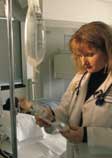 Radioimmunotherapy: Ready for prime time? These are exciting times for radioimmunotherapy scientists. Two years ago, the first monoclonal antibody for lymphoma went on the market, with impressive results in patients. Recently, two pharmaceutical companies filed drug applications with the FDA to offer monoclonal antibodies tagged with radiation. FDA approval would help establish radioimmunotherapy as a mainstream treatment for lymphoma and other cancers, said Gerald DeNardo, principal investigator of the Radiodiagnosis and Therapy Program at UC Davis. And not a moment too soon. "Radioimmunotherapy should be combined with other modalities as a part of a first-line treatment in a multidisciplinary cancer program," DeNardo said. "Unfortunately, it is sometimes used too late to be effective." The UC Davis radioimmunotherapy program uses Lym-1, an older and well-established mouse antibody, for people with lymphoma and M170, a newer antibody, for people with metastatic breast and prostate cancer. The M170 treatment has reduced pain and prostate specific antigen levels in prostate cancer patients, and elicited a response (but not remission) in more than half the breast cancer patients. The recent agreement with Lawrence Livermore National Laboratory is another hopeful sign, opening avenues for using the science laboratory's patented Peregrine radiation delivery system in radioimmunotherapy. Named after the patron saint of cancer patients, Peregrine uses three-dimensional mathematical calculations to simulate the trillions of radiation particles entering the body during treatment and to accurately predict radiation dose. Patient CT scans are used to tailor dose calculations based on each patient's anatomy and disease. The DeNardos are working with Christine Hartmann-Siantar at Lawrence Livermore to develop a Peregrine module that will better target the tiny radioactive antibodies used in treatment. "We are exploring a whole series of initiatives with Lawrence Livermore that will help us better plan treatment for our patients," said DeNardo. "The possibilities are very exciting."
Home |
Table of Contents |
To our Readers |
Building on Basics UC Davis Health System | © 2000, 2001, 2002 UC Regents. All rights reserved. |
Oncology clinical nurse specialist Desiree Goldstein monitors a patient during infusion. |

